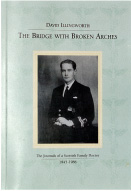 From: David Illingworth’s autobiography Bridge with Broken Arches From: David Illingworth’s autobiography Bridge with Broken Arches
Dick Turner had not failed to notice George’s reaction. The following morning we were paraded before the Chief. “Did I detect a note of rebellion recently, chaps? Don’t you know how lucky you are? My God, you might be bank clerks counting money all day. Life may be hard but it’s not dull. Face up to the next hurdle, the Membership. If you succeed you’re made. But should you fail, you’ll have to depend on the mercy of the Post-Graduate Board for an extension of your appointments. Don’t let me down! If you do, you might go hungry.”
The candidates rushed home as soon as possible for a last look at the textbooks. The underground in Medicine had it that only 20% of the candidates succeeded in the examination for Membership of the Royal College of Physicians and that it was really a competitive event. Their very survival depended on the result. On the clinical side George and David did well, but the written papers were tough going for both. Everything hinged on the ‘orals’. George was asked about his school, his father and his war record, before being nailed on an esoteric medical problem which made him quite speechless. I was led into one of the College cubicles and faced two expressionless men. The younger one, Dr Batty, began. “Tell me about the development of the lens of the eye.” The candidate was at least honest. “Sorry, sir, I don’t know.” “Tell me then, Illingworth, the percentage of people who are left-handed?” The other examiner stepped in as my stammer prevented articulation. I didn’t know anyway. A leaden silence ensued during which the candidate struggled for self-control and rational speech. But it was too late. I’d answered nothing! “Thank you, doctor, that’s all.”
I bowed and stumbled out to await the outcome of the examiners’ meeting the next morning. Things looked black! The examinees were huddled at one end of the large hall. At the other end stood the secretary who read out the names of the successful doctors in alphabetical order. “Illingworth”, located nearer the beginning of the alphabet, knew before George that he had failed. Thornton had to wait rather longer before joining the disconsolate majority who trooped away to their personal oblivion. Turner shuffled his feet. “Bad luck, chaps, but at least you’ve tried. Resit and I’ll try to get your appointments extended by the Post-Graduate Board.” “Might as well apply for a season ticket,” groaned George. “I think we should lay off for a bit.” I agreed that the dice had been loaded against us. The examination had devastated me. I had vomited each morning of its duration. On the third day, in an effort to occupy myself, I had bathed my baby son. So nervous was I that I dropped the child on its head. Lesley forgave me, understanding that her husband was playing for impossible stakes.
So we concentrated on medicine and forcibly forgot about our failures. We trundled from clinic to clinic, burning electricity far into the night as we devoured textbooks and articles and neglected our marriages. Happily there came easier times with the arrival of Drs Warnock and Robson to supplement Turner’s staff. Each newcomer had a sense of humour and a Membership of the College. Not only was the teaching load immediately reduced, but they began to help George and me in the examination gamble. It was the examination mixture as before. I vomited each morning; George had tremors. On this occasion it was the candidate in the next examination cubicle who was asked about the development of the lens of the eye. He promptly walked out and was replaced by a doctor, hooked on barbiturates, who had calmed his pre-examination nerves with sodium amytal. The first question answered, the candidate then dozed off and slipped from the chair. I looked across in time to see the servitor dragging out the examinee. “That’s two less to reckon with,” I thought and began to assert myself as Norrie Robson and Guy Warnock had taught me. The next morning our names were included in the 20% success list. George was speechless and quietly disappeared. As for me, stunned, I asked for confirmation and wandered blindly along Queen Street looking for a telephone kiosk. Each was occupied until I reached Castle Street. I dialled home and fell apart at the overstretched seams of my emotions. The instant security of success, although ephemeral like all else in medical life, was too much for me.
|

